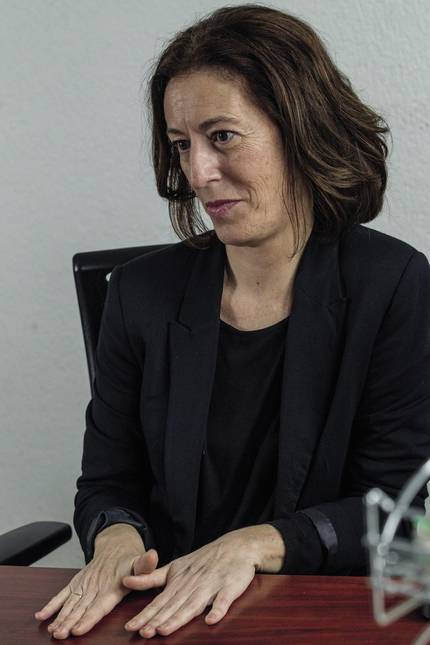“Data is not things, they are part of people”

As the technique has evolved, concerns have changed. Now, one of the biggest concerns is data management, big data: the possibility of using giant databases, which constitute a raw material for research. It seems that the data can have commercial value and lose control over them. Can our privacy be threatened? Yes, we have seen it in other areas: On Facebook, for example.
There are also permanent concerns. For example, genetic editing techniques that can transform people's DNA. But at the same time, genetic editing also raises future concerns about the integrity of human DNA. Is it possible for human DNA to transform and endanger the human species? We have to foresee future scenarios.
Big data is the use of large databases. But it's not a simple list with a lot of data. The technique of big data is to cross information, combine data from different origins. Imagine: it is possible to combine clinical histories with patient data in your apps, with data on your life habits, with consumption habits, with data obtained in research projects, etc. If you mix multiple data types, conclusions can be drawn that cannot be extracted when analyzing data independently.
It is important for people to know what data they are using, as combining them, their use is no longer so innocent. You can also draw unexpected conclusions about yourself. Therefore, the challenge of big data is to have control over this personal information and, above all, its use.
When the data is processed for clinical purposes, professionals must maintain medical secrecy, so there will be no express authorization for the extraction and conservation of the data. These works are mandatory and mandatory. The exception is genetic data. In this case the authorization must be signed. Why am I authorizing? To act in my favor: only for my diagnosis, treatment and prevention. That is what the law says. But the information generated there may have another use: research. The problem is that the law regulating medical history is not clear. Allows different interpretations.
The biomedical research law regulates only the use of biological samples, but not data. It regulates the use of blood or part of a tumor. There is a sample storage system: biobanks. You deliver the samples and distribute them to researchers. The law has adopted mechanisms to accelerate research. Something similar could be done with the data.
To do so, the law should require the express consent of the patient, or other guarantees that may legitimize their use, such as anonymization of the data, separation of my identity. Thus, they are taken from clinical histories, but they do not know who they are from. Precisely now we are working on a project called big health data to propose a reform of the law.
The first proposal will be for a clear law. Second, the need for authorization. But we can lay a foundation that makes it easier for researchers to do their work, since when data from thousands of people are needed, the need to ask for permission makes research very difficult and it is not about reducing the use of data, but rather facilitating it. In suitable conditions, that is.
Therefore, more guarantees are needed: that projects that will use the data have to go through the analysis of an ethical committee. On the other hand, the information. The public must know where they can obtain information about the use of their data and if they wish to delete it, they must respond to that request.
Of course, in the case of rare diseases, the approach must be international. There are not enough patients in each country. International networks allow organizations to share data, samples and patients. It is important to work on it. Especially in rare diseases, but in general in science. Science has no limits. Data must be international.
No. And it is important to clarify, since there is a very serious conceptual confusion in this matter. Sometimes we talk about data owners, and that language is very malicious. “Sell data.” When we talk about selling and buying we talk about rights about things. But data is not things, they are part of people. They are personality goods: they cannot be renounced or prescribed. No one can tell me that you have sold my data and are now owned by another.
Companies may have the right to use the data if you authorize it. But can you charge it for leaving it to another company? No. If you have spent money processing this data or developing software that allows you to see it better, you may charge the service but not for the data.
Of course, in the end it is based on the particularities of each individual, so genetic analysis is necessary. For example, to clarify if you share a concrete mutation in your family. What questions are asked? For example, how to share information between the patient and his or her family. How to manage medical secrecy, if the information obtained can benefit not only the patient but also his family, since the disease is hereditary.
Recently, an incident occurred in the UK in which a patient's daughter sued the hospital that diagnosed her father with a very serious genetic disease because they had not informed her daughter. Neither the father nor the hospital doctors. His father and daughter died and questioned the doctors at the hospital because if he knew that there was a disease he had and that he was at risk of transmitting it to his children, because he would never become pregnant, it was a very serious disease. The hospital was acquitted, only because of the obligations of physicians to patients. But he has filed the appeal and the matter must be reviewed.
I don't think the doctor has to have that responsibility. In fact, it is necessary to maintain medical secrecy to maintain people's confidence. It is essential to know that what is spoken in the consultation will be between the doctor and me. There may be some exceptional case involving violation of this medical secret, but very exceptional.
However, when someone has to perform a genetic analysis, we must predict that it can also be important for family members: “Your family should get involved in the process, because it can be very important to them.” But human relationships are very complex, and those engaged in genetic counseling clearly say that in some circumstances people do not want to share that information with their family.
Errors in diagnoses, false positives. Rarely, but they hurt you a lot. I am not a lawyer and do not live directly, but I remember the case that a woman decided to remove the uterus and ovaries because they told her in the Genetic Counseling Unit that the analysis of hereditary cancer gave a positive result. She was told that her children would have a 50% chance of developing colon cancer and the woman decided not to have children or sterile. Later he discovered that he had no mutations, which was a mistake. Genetic studies can lead us to make very drastic decisions.
I remember Angelina Jolie when she decided to tear her breasts as a preventive measure. Since his family had several cases, he made the decision that he was also at risk for breast cancer. From then on, this mentality gained strength, that is, taking measures to avoid diseases and you have to be very careful.
Very little. The Spanish Association of Human Genetics made a statement against it. The law regulating genetic studies establishes that these studies must always be carried out accompanied by a genetic advice; it is essential. An expert should explain why the study should be conducted and then clarify the meaning of the results. Are these requirements met?
In research, I think internationality. And in the clinical, health, science will force us to know how to manage the uncertainty of its own future. Having genetic information will inform you of your possible future illnesses, usually probabilities. Yours and your family. How will we manage that uncertainty for the future? Sometimes there will be treatments available and others will not. Will we take preventive measures? There is a risk of not doing things right. Knowing how to manage this information for the future will be one of the great challenges for people.
Buletina
Bidali zure helbide elektronikoa eta jaso asteroko buletina zure sarrera-ontzian














